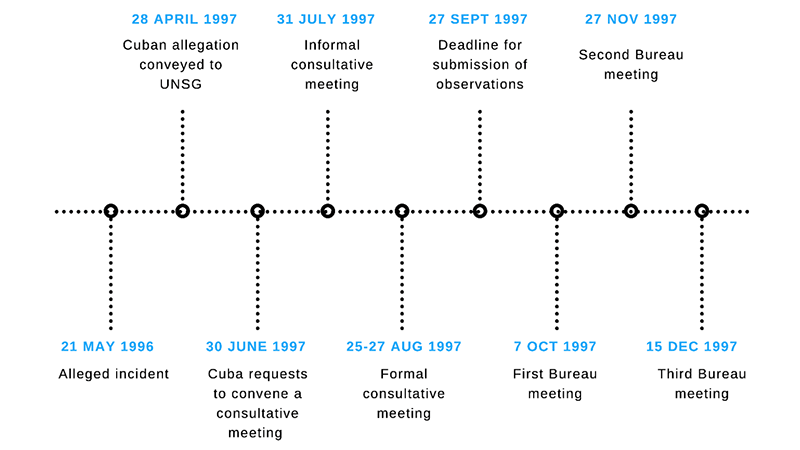27 July 2022
Following a series of allegations that US-backed biological labs in Ukraine are developing bioweapons, the Russian Federation has recently invoked the Article V consultative process of the 1972 Biological and Toxin Weapons Convention (BWC). The United States and Ukraine have firmly denied these allegations.
The existing biological disarmament architecture provides States with tools to address their concerns. The use of these tools presents several challenges in the current environment that BWC States Parties will need to consider.
What is Article V of the BWC?
Under Article V of the BWC, States Parties:
“…undertake to consult one another and to co-operate in solving any problems which may arise in relation to the objective of, or in the application of the provisions of, the Convention. Consultation and co-operation pursuant to this Article may also be undertaken through appropriate international procedures within the framework of the United Nations and in accordance with its Charter”
Two aspects of this article are of note. First, consultations and cooperation under Article V can be applied to “any problem” in relation to the articles or the preamble of the BWC. As such, Article V is broad in scope. Second, the language “appropriate international procedures within the framework of the United Nations” suggests a degree of latent potential. Appropriate procedures could be interpreted as referring to the Security Council or other UN processes.
Article V has been developed further through additional understandings reached at past five-yearly review conferences, but particularly at the Second and Third Review Conferences in 1986 and 1991, respectively. In 1986, States Parties acknowledged, among other things, “the right of a party to request a consultative meeting” and that any State Party would also have the right to “request specialized assistance” without the risk of a UN Security Council veto.
In 1991, States Parties took this further still by elaborating a timeline for the convening of both an informal procedural meeting of interested parties (30 days) and the formal consultative meeting (within 60 days of receipt of the request). The Third Review Conference also elaborated on, among other things, the rules of procedure (rule 28 of the rules of procedure of the Review Conference) and the financing of such a meeting (“costs of the consultative meeting shall be met by the States Parties participating in accordance with the United Nations assessment scale prorated”).
Article V Usage
By the Second Review Conference in 1986, it was clear that some states had invoked Article V consultations, at least bilaterally and albeit with limited success. For example, the United States engaged in bilateral consultation with the USSR in relation to the Sverdlovsk incident.
Article V has also been used in “multilateral mode” in 1997 following Cuban allegations of US “biological aggression”. Specifically, Cuba accused the US of releasing the crop pest Thrips palmi over Cuban territory, an allegation the US dismissed as “outrageous”. Nonetheless, Cuba requested that the Russian Federation as a Co-Depository convene a consultative meeting. The Russian Federation correspondingly arranged an informal meeting at which States Parties agreed on procedures, dates, and times for the formal consultative meeting. The latter was scheduled to take place between 25 and 27 August under the Chairmanship of Ambassador Ian Soutar of the United Kingdom. For a timeline of events related to this Article V consultation see figure 1 below.
Figure 1. BWC Article V consultation timeline as applied in 1997

At the formal consultative meeting, States Parties agreed to additional procedural steps, including the election of a geographically representative set of six vice-chairs. Subsequently, both Cuba and the US had 30 minutes each to make their arguments, drawing on a range of available evidence. The two then made further statements “amplifying points raised in their formal statements” before other states provided input.
Although several States Parties felt the Article V process had been fulfilled, others contended there was insufficient time to address ambiguities. States Parties were therefore invited to submit “observations, including from national technical experts” on the information provided by Cuba and the United States by the 27 September. Thirteen parties submitted such observations. Several states indicated that the allegations either could not be substantiated or that there was no causal link. Other states remained unconvinced or found it difficult to draw conclusions in the time available.
Such observations were discussed at a second bureau meeting in November. This was followed by a third and final bureau meeting organized to draft the final report. The report concluded: “due inter alia to the technical complexity of the subject and to the passage of time, it has not proved possible to reach a definitive conclusion regarding the concerns raised by the Government of Cuba”.
Procedurally, the experience with Article V in 1997 was a success. The process opened up a space for Cuba and the US to present their arguments and have their say. Cuba chose not to pursue any further follow-up procedure nor seek specialized assistance – for example from the World Meteorological Organization or the Food and Agricultural Organization.
The experience is insightful for any future multilateral consultative meeting and provides some useful lessons learned: first, selecting a “geographically representative vice chair[s] to constitute the bureau” provided “valuable collective legitimization”; second, the “one-month time limit” for the submission of observations was of value; and third, the decision to “invite the two states in dispute to comment on the observations submitted” aided the process through the creation of a “second round of written comments”.
Present and Future Challenges for the Use of Article V
Article V has latent potential to address any issues related to the BWC. As an explicit component of the treaty, Article V is readily available to address States Parties’ concerns and prevent problems from festering. However, the use of Article V in the current environment presents several challenges.
-
Financially, there is no budget for an Article V consultation, yet the UN budget system requires that resources be available in advance of any meeting.
-
Logistically, dates and venues for any meeting are extremely hard to find in the context of the UN’s extremely busy disarmament calendar. .
-
Procedurally, it is unclear who would chair a meeting, and any request for specialized assistance would leave States Parties in uncharted territory.
-
Substantively, While the forthcoming consultative meeting could allow states to “have their say” and help insulate the BWC Review Conference, it could equally drag on and exacerbate tension at a critical point in the evolution of the BWC. The 1997 consultative process, for instance, took six months. Moreover, the Article V consultative meeting invoked by the Russian Federation is unlikely to produce an unequivocal and conclusive report, particularly in this period of geostrategic tension. Nor is an exchange of evidence necessarily going to alter the views of those already reconciled to a particular worldview.
In the short term, States Parties will need to find solutions to some of these challenges to proceed with the anticipated Article V consultative meeting. At the Ninth BWC Review Conference later this year, States Parties could update Additional Understandings related to Article V drawing on lessons from the current experience. This could involve laying out roles for the Implementation Support Unit in facilitating bilateral consultations, making provisions for financing consultative meetings, and developing procedures for the use of specialized assistance.
In the longer term, the experience highlights the importance of putting in place measures to build the BWC’s “compliance ecosystem”, drawing on technological opportunities and new tools to build greater confidence in compliance.
Dr James Revill is the Head of the WMD and Space Security Programmes at UNIDIR. His research interests focus on the evolution of the chemical and biological weapons regimes, and he has published widely in these areas.

